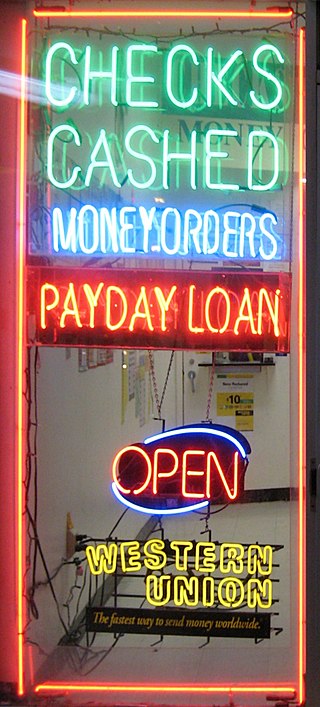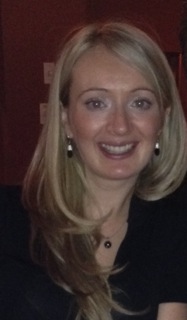
Debt is an obligation that requires one party, the debtor, to pay money borrowed or otherwise withheld from another party, the creditor. Debt may be owed by a sovereign state or country, local government, company, or an individual. Commercial debt is generally subject to contractual terms regarding the amount and timing of repayments of principal and interest. Loans, bonds, notes, and mortgages are all types of debt. In financial accounting, debt is a type of financial transaction, as distinct from equity.

Personal finance is the financial management that an individual or a family unit performs to budget, save, and spend monetary resources in a controlled manner, taking into account various financial risks and future life events.
Refinancing is the replacement of an existing debt obligation with another debt obligation under a different term and interest rate. The terms and conditions of refinancing may vary widely by country, province, or state, based on several economic factors such as inherent risk, projected risk, political stability of a nation, currency stability, banking regulations, borrower's credit worthiness, and credit rating of a nation. In many industrialized nations, common forms of refinancing include primary residence mortgages and car loans.

The Federal Home Loan Mortgage Corporation (FHLMC), commonly known as Freddie Mac, is an American publicly traded, government-sponsored enterprise (GSE), headquartered in Tysons, Virginia. The FHLMC was created in 1970 to expand the secondary market for mortgages in the US. Along with its sister organization, the Federal National Mortgage Association, Freddie Mac buys mortgages, pools them, and sells them as a mortgage-backed security (MBS) to private investors on the open market. This secondary mortgage market increases the supply of money available for mortgage lending and increases the money available for new home purchases. The name "Freddie Mac" is a variant of the FHLMC initialism of the company's full name that was adopted officially for ease of identification.

Credit card debt results when a client of a credit card company purchases an item or service through the card system. Debt grows through the accrual of interest and penalties when the consumer fails to repay the company for the money they have spent.
The debt snowball method is a debt-reduction strategy, whereby one who owes on more than one account pays off the accounts starting with the smallest balances first, while paying the minimum payment on larger debts. Once the smallest debt is paid off, one proceeds to the next larger debt, and so forth, proceeding to the largest ones last. This method is sometimes contrasted with the debt stacking method, also called the debt avalanche method, where one pays off accounts on the highest interest rate first.
The debt diet refers to a debt management plan made popular by a multipart series for The Oprah Winfrey Show, first airing on February 17, 2006. In the series, Oprah Winfrey teamed up with financial experts Jean Chatzky, Glinda Bridgforth and David Bach to create a step-by-step plan demonstrating how to get out of debt.

Red Ventures is an American media company that owns and operates brands such as Lonely Planet, The Points Guy, Healthline, and Bankrate. Red Ventures focuses on news, advice, and review websites. The company's corporate headquarters is located in Fort Mill, South Carolina, a suburb of Charlotte, North Carolina.

David Lawrence Ramsey III is an American radio personality who offers financial advice. He is the owner and CEO of Ramsey Solutions and co-hosts the nationally syndicated radio program The Ramsey Show. Ramsey has written several books, including The New York Times bestsellerThe Total Money Makeover, and hosted a television show on Fox Business from 2007 to 2010.
Bankrate, LLC is a consumer financial services company based in New York City. Bankrate.com, perhaps its best-known brand, is a personal finance website. As of November 8, 2017, it became a subsidiary of Red Ventures through an acquisition.
The Ramsey Show is a three-hour self-syndicated radio program and podcast, co-hosted by finance author and speaker Dave Ramsey and a rotating Ramsey Personality, that airs Monday through Friday from 2:00–5:00 P.M. ET. It is broadcast from the headquarters of Ramsey's company, Ramsey Solutions, in Franklin, Tennessee.

The Confederate States of America financed its war effort during the American Civil War through various means, fiscal and monetary. As the war lasted for nearly the entire existence of the Confederacy, military considerations dominated national finance.
SoFi Technologies, Inc. is an American personal finance and financial technology company. Founded in 2011 at Stanford University, it operates as a direct bank and supports other financial institutions through its technology platform. As of 2024, SoFi reports 9.4 million customers and 160 million platform accounts.

Lesley-Anne Scorgie is a Canadian author, speaker and personal finance consultant based in Calgary, Alberta. She published her first book titled Rich by Thirty: A Young Adult’s Guide to Financial Success in 2007 followed by a second book in 2010. Scorgie released her latest book titled Well-Heeled: The Smart Girl’s Guide to Getting Rich in 2014.

Howard Dvorkin is a CPA, author, national columnist, philanthropist, and founder of the nation's largest credit counseling agency. The chairman of Debt.com, he has advocated a cash-only lifestyle without credit cards.
Rachel Cruze is an American author, speaker, and personal finance expert. Her book, Smart Money Smart Kids, co-authored with her father, Dave Ramsey, reached number one on The New York Times Best Seller list in 2014. Her second book Love Your Life, Not Theirs: 7 Money Habits for Living the Life You Want was published in 2016.
Money Under 30 is a personal finance website specializing in financial advice for young adults.
Chris Hogan is an American author, personal finance expert, and former radio show host.
Tori Dunlap is an American businesswoman, author, podcaster, and speaker. She is the founder of 'Her First $100K', which is a financial education company aimed at young women.
Russia defaulted on part of its foreign currency denominated debt on 27 June 2022, because of funds being stuck in Euroclear. This was its first such default since 1918, back then it was just ruble-denominated bonds, not foreign currency debt. Before that, on 2 June, Russia defaulted on the 30-day interest, incorrectly not counting interest for the grace period, but a failure to pay $1.9 million was not sufficient to trigger a cross-default across other instruments, because the minimum threshold is an amount of at least $75 million, according to documents for other Russian eurobonds. The default occurred due to technicalities as the payment in dollars was impossible due to the sanctions by US and EU authorities, but did not mark an actual lack of capability to pay its debts.









